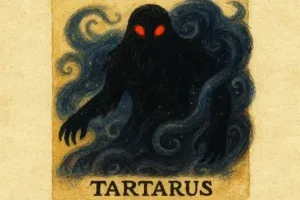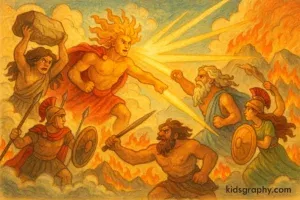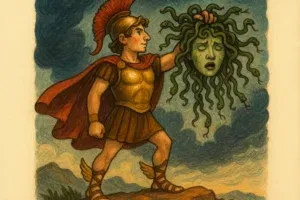In the rich and legendary world of Greek mythology, few gods shine as brightly as Athena. She was the goddess of wisdom, war, strategy, and skill, and unlike the wild gods of Olympus, Athena stood for logic, justice, and smart decisions.
Let’s dive into the full Athena Greek mythology story, uncovering her powers, unique birth, and role among the gods.
Read More: Circe in Greek Mythology: The Witch of Aiaia
The Birth of Athena: A Unique Beginning
The story of Athena’s birth is one of the most unusual in all of Greek mythology.
According to ancient myths, Zeus, the king of the gods, feared that his child with the goddess Metis would be more powerful than he was. So, to stop that, he swallowed Metis whole while she was still pregnant.
Later, Zeus began to suffer from a terrible headache. The pain grew so strong that he begged someone to split his head open. When Hephaestus (the god of fire) did, Athena sprang out fully grown and fully armed, shouting a battle cry.
This amazing entrance marked Athena as a unique goddess—born without a mother, straight from the mind of Zeus, and filled with wisdom and strength.
Athena’s Powers in Greek Mythology
Athena’s powers were a perfect balance of brain and brawn. She was not only a skilled warrior but also a wise thinker and planner.
Here are some of her most powerful traits:
- Wisdom and Intelligence: Athena was the goddess of logic, learning, and clever ideas.
- Strategy in War: Unlike Ares, who loved chaos, Athena focused on smart battle plans.
- Craftsmanship: She helped people with weaving, metalwork, and building.
- Protector of Cities: Athens, one of the greatest Greek cities, was named after her.
- Justice and Fairness: Athena always believed in fair judgment and stood for truth.
She carried a shield called the Aegis, often with the head of the Gorgon Medusa, and her favorite companion was the wise owl, a symbol still used today to represent wisdom.
Read More: Prometheus in Greek Mythology: The Fire Bringer
Athena and the Other Greek Gods
Among the many gods of Olympus, Athena had a special place. She was one of the twelve Olympians and often took part in major myths and battles.
Though she was a war goddess, she often helped heroes rather than fight them herself. She guided:
- Odysseus during his long journey home in The Odyssey.
- Perseus, by giving him the shield to defeat Medusa.
- Heracles, during his Twelve Labors.
- Jason, in his quest for the Golden Fleece.
Athena was always calm, composed, and thoughtful—a true counselor of heroes.
Facts About Athena in Greek Mythology
Want to know more about this legendary goddess? Here are some fascinating facts about Athena:
- She never married: Athena remained a virgin goddess, devoted to wisdom and purpose.
- She invented many tools: Including the bridle for horses and the flute.
- Athens was named after her: She won the city in a contest against Poseidon by gifting the olive tree.
- She had no mother: Uniquely born from Zeus’s head.
- She hated injustice: She played key roles in court scenes, like in the trial of Orestes.
Athena was both admired and feared. She inspired respect because she was powerful, but never cruel or unfair.
Read More: Cronus in Greek Mythology: Titan of Time and Power
The Legacy of Athena Today
Today, Athena remains a symbol of wisdom, courage, and justice. Statues of her stand in museums and public buildings around the world. Schools, cities, and even space missions use her name to show strength and intelligence.
In many ways, Athena is more than a myth. She represents the power of thinking clearly, standing bravely, and doing what is right—qualities that never go out of style.
Read More: Typhon in Greek Mythology: The Father of Monsters
Symbols of Athena: What Did She Represent?
Athena had many symbols that showed her character and powers. These were used in temples, on coins, in statues, and in art across ancient Greece.
Here are the most important symbols of Athena:
- The Owl 🦉 – A sign of wisdom and sharp vision, often perched beside her.
- The Olive Tree 🌿 – A gift she gave to Athens, symbolizing peace and prosperity.
- The Aegis Shield – A magical shield often shown with the face of Medusa, used to strike fear.
- The Spear and Helmet – Representing strategy and readiness, not reckless battle.
These symbols helped people recognize Athena’s values: wisdom, fairness, strength, and protection.
Athena vs. Poseidon: The Contest for Athens
One of the most famous stories about Athena is how she won the city of Athens.
Both Poseidon, the god of the sea, and Athena wanted to be the city’s protector. To decide, the gods held a contest: each would offer a gift to the people of the city, and the best gift would win.
- Poseidon struck the ground with his trident and created a saltwater spring (or a horse, in some versions).
- Athena planted an olive tree, offering food, oil, and wood.
The people chose Athena’s gift, and the city was named Athens in her honor. This myth shows Athena’s wisdom and usefulness over force and pride.
Read More: Hermes in Greek Mythology: Messenger of the Gods
Athena and Medusa: The Gorgon’s Curse
Another powerful myth connects Athena to Medusa, the snake-haired woman who turned people to stone.
In many versions, Medusa was once a beautiful priestess in Athena’s temple. But after she was attacked by Poseidon in the sacred space, Athena transformed her into a Gorgon, with snakes for hair and a gaze that killed.
Later, when the hero Perseus needed help to defeat Medusa, Athena gave him a shining shield. He used it as a mirror to avoid Medusa’s deadly eyes and cut off her head.
This myth is complex and often debated, but it shows Athena’s role as a protector of her sacred spaces and a guide for heroes.
Temples and Worship of Athena
The most famous temple of Athena is the Parthenon, standing proudly on the Acropolis of Athens. Built in her honor, the Parthenon was:
- A center of worship and festivals
- Home to a giant statue of Athena Parthenos, made of gold and ivory
- A symbol of Athens’ power, knowledge, and faith
Athena was honored every year in the Panathenaic Festival, where people carried her sacred statue through the city, offered sacrifices, and celebrated her wisdom.
Read More: Chaos in Greek Mythology: The First Being of Creation
Athena in Modern Times
Even today, Athena remains a powerful symbol in books, films, and daily life:
- In science, her name is used in space missions and academic projects.
- In literature, she appears in stories like Percy Jackson, guiding heroes once again.
- In law and education, her image is used to represent truth and learning.
Athena is proof that ideas like wisdom, strategy, and justice never grow old.
More Stories: Athena in Greek Mythology
FAQ: Athena in Greek Mythology
Athena is the Greek goddess of wisdom, war, and strategy. She was born from the head of Zeus and is one of the twelve Olympian gods.
Athena has powers of wisdom, battle strategy, crafting, and justice. She guides heroes and protects cities like Athens.
Athena had no mother and was born from Zeus. She remained a virgin goddess and had no children or spouse.
Athena gifted the olive tree to the people of Athens and became their protector. The city was named after her in her honor.
Athena is symbolized by the owl, the olive tree, the spear, and the Aegis shield with Medusa’s head.
Read More: Pandora in Greek Mythology: The First Woman’s Curse












